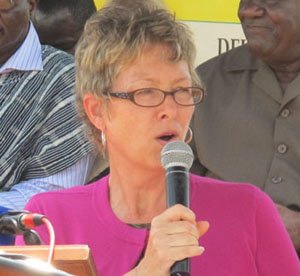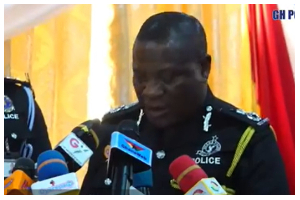Cheryl Anderson, outgoing Ghana Mission Director of the United States Agency for International Development (USAID), says persistent development challenges such as erratic electricity supply and access to credit must be resolved as soon as practicable if Ghana wants to truly emerge as a middle-income country.
Speaking at a meeting with the media in Accra, Ms Anderson said Ghana is among a few countries in sub-Saharan Africa which are expected to meet the Millennium Development Goal of halving the poverty rate by 2015. She called on Government to address the country’s economic challenges.
Ms Anderson said the United States Presidential Initiative on Malaria, Power Africa, Feed Future, among other interventions, were designed to help Ghana and four other developing nations. She described the USAID-Ghana’s five-year strategic plan development (2013-2017) as the outstanding achievement during her tenure.
She said Ghana attained lower middle-income status during her tenure. Ms Anderson takes up her new appointment in Pretoria, South Africa as the USAID Southern Africa Regional Representative on August 12, 2013.
She indicated that USAID was committed to addressing the root causes of hunger that limit the potential of millions of people and establishing a lasting foundation for change by aligning resources with country-owned processes and sustained, multi-stakeholder partnerships.
“USAID programmes increase the competitiveness of Ghana’s private sector by improving the enabling environment for private sector development, modernizing the agricultural sector, and strengthening the private sector’s capacity to produce quality agricultural and agro-processed products.
Some USAID projects in Ghana include the Integrated Coastal and Fisheries Governance Programme, which assists the country to sustainably manage its marine ecosystems and improve the livelihoods and food security of coastal communities; the Ghana Strategic Support Programme, which addresses specific knowledge gaps concerning agricultural and rural development strategy implementation and also develops methods to improve the data and knowledge base; and the Ghana Agricultural Development and Value Chain Enhancement programme, which seeks to improve the competitiveness of the targeted agricultural commodity value chains of rice, maize and soya.
The project operates in Ghana’s Northern Region, Upper West Region and Upper East Region. The Business Sector Advocacy Challenge Fund (BUSAC) project seeks to improve the business environment in Ghana to promote the private sector growth, including the agricultural sector. BUSAC activities focus on the three northern regions.
The project is being implemented in partnership with DANIDA and European Union (EU) through a new delegated cooperation agreement.
Business News of Friday, 9 August 2013
Source: Daily Guide
‘Ghana must resolve development challenges’
Entertainment












